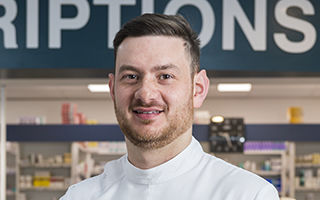 According to a study by the University of Adelaide1, inadequate sleep affects as many as 33-45% of adults across all age groups.
According to a study by the University of Adelaide1, inadequate sleep affects as many as 33-45% of adults across all age groups.
Medical conditions that affect sleep such as sleep apnoea are also very common and can have a profound effect on day-to-day functioning. Unravelling the cause of your sleep issues isn’t always easy though. Your community pharmacist may be able to help you solve some of the mystery around your poor sleep health, including identifying:
- Lifestyle factors - Discovering habits that may be affecting the quality of your sleep or lack of sleep, for example using a computer just before bed or drinking a number of caffeinated drinks during the day.
- Medication side effects - Determining if medications you are taking may be negatively impacting on your sleep patterns. For example, medicines used to treat conditions such as epilepsy and Attention Deficit Hyperactivity Disorder (ADHD) can cause sleep disturbances in some individuals.
- Obstructive Sleep Apnoea (OSA) – OSA is a condition where the walls of your throat come together when you sleep causing you to stop breathing for a short while. This then causes you to stir and open your airway again. You may have noticed that you wake in the morning still feeling tired; feel sleepy during the day; you may have difficulty concentrating; and suffer from morning headaches. If your partner has also complained about your loud snoring and gasping in your sleep, then it’s a good idea to have a sleep apnoea test. Speak to your pharmacist about undertaking a sleep apnoea test. The machine monitors your blood oxygen levels, breathing, heart rate and brain activity and the results are emailed to a specialist sleep doctor to make the diagnosis. If you are diagnosed with OSA, your pharmacist can provide advice on how best to manage the condition, including managing your weight and quitting smoking. Your doctor may prescribe the use of a special machine, called a CPAP or Continual Positive Airway Pressure machine. This is used to keep your airways open while you are sleeping.
- Restless Leg Syndrome (RLS) – RLS is a neurological disorder where patients describe uncomfortable sensations in their legs, like “things crawling under their skin”. This can feel like a burning sensation, pins and needles or itching. It’s compelling enough for the person to want to move. Movement brings some relief, but it does disrupt sleep and can affect your qualify of life. The good news is there are medicines that can provide relief for RLS and by also making some lifestyle changes that improve your sleep hygiene; you can experience a big difference.
Remember, your community pharmacist is an easily accessible source of advice and support if you are experiencing poor sleep. Capital Chemist in Hughes specialise in assisting people suffering from Sleep Apnoea and Harry (in the photo) is recognised throughout Canberra for his expertise in assisting people in this regard.
[1] https://www.sleephealthfoundation.org.au/pdfs/surveys/SleepHealthFoundation-Survey.pdf


